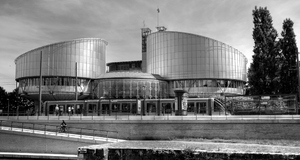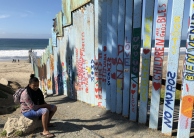From Cornell International Affairs Review VOL. 3 NO. 2Judging Wars: The International Politics of Humanitarian Adjudication
By
Cornell International Affairs Review 2010, Vol. 3 No. 2 | pg. 1/1
IN THIS ARTICLE
KEYWORDS
The past sixty years witnessed a global proliferation of international courts and tribunals of almost all sizes and purposes. Today, they play important roles in international governance by handing down decisions in compelling areas ranging from global trade to environmental protection. In the past two decades, their reach has even extended into the realm of armed conflict and humanitarian policy. However, unlike domestic courts, international tribunals lack centralized enforcement mechanisms. Does this follow the classical assumption that they are merely toothless tigers and instruments to further state interest? This paper attempts to dissect the under-theorized and complex activity of international humanitarian adjudication. It seeks to understand how the judging of war crimes differs from judicial policy-making in other less controversial areas. It contends that even though states retain significant influence over the behavior of international humanitarian courts, the latter are not entirely irrelevant in contemporary international affairs. The establishment of two ad hoc UN tribunals and the recent inauguration of the International Criminal Court provide researchers with important case studies to test these propositions. The six decades after the end of World War II saw the flowering of adjudicative institutions on multiple levels of international governance. More than fifty international courts and quasi-judicial organizations have been set up only in the past two decades.1 As of 2006, at least seventeen "long-standing" tribunals which use international law and issue binding judgments to resolve disputes were in active operation.2 International adjudicatory bodies have become one of the main sites for the coordination of global and regional policies, from "multibillion dollar" trade disputes to the use of seabed resources3 and from labor standards to environmental regulation.4 Many international courts now impact profoundly on international politics. For instance, the European Court of Justice constantly weakens state power5 by acting as an institutionalized mechanism of transnational conflict resolution within the European Union.6 The World Trade Organization (WTO) Appellate Body has been regarded as instrumental to the emergence of a set of coherent world trade norms.7 By the 1990s, the reach of international judicial institutions has finally extended into the politically sensitive areas of armed conflict and humanitarian policy. Special humanitarian tribunals have been set up to manage cases from the former Yugoslavia and Rwanda. Mixed courts consisting of both international and domestic judges were created in states like Cambodia and Sierra Leone. On 1 July 2002, the long-awaited permanent International Criminal Court (ICC) was formally inaugurated. It remains a question whether international humanitarian adjudication, like European or trade adjudication, can generate new norms regulating state conduct and alter the political landscape of international affairs. Judging the Sovereigns: International Tribunals in International PoliticsTraditional diplomatic methods of conflict resolution no longer dominate the scene as the only major means to settle international disputes. Legalization is now gaining prominence. International tribunals, involved in virtually every area of international conflict, often appear physically like domestic courts – their members, who wear robes, are called "judges;" they adopt adversarial systems; depend on legal arguments; and deliver reasoned and binding public rulings.8 Brubaker advocates that an accelerated legitimation of international judicial bodies will further enhance the public confidence in the rule of law and motivate both governmental and private parties to rely on international law to resolve conflicts, protect individual rights, and facilitate political stability.9 However, to draw an analogy between international and domestic courts can be misleading. The "critical difference" between the two is that the former lacks an effective and coercive state apparatus to enforce their decisions.10 In international relations theory, realists and some rationalists contend that international legal institutions, if not also international law itself, are created by influential and self-interested states to further their political objectives.11 Writing within the rational choice tradition, Guzman argues that the "primary role" of international tribunals is simply "informational."12 International courts influence state behavior by clarifying, in a particular dispute, whether a certain state has violated the rules of international law. This declaration of the law will indirectly shape the future behavior of other states when they experience a similar situation. Posner holds a more pessimistic view. For him, the profusion of international courts is "a sign of the weakness of the international system, not its strength."13 In other words, the installation of new specialized courts is an outcome of the failure of states to manipulate existing generalist tribunals. Apparently, liberal democratic states are more likely to submit to the jurisdiction of international tribunals as opposed to undemocratic regimes.14 But when compared to smaller states, major powers, whether democratic or not, tend to be reluctant to let international judges intervene with their disputes. The United States, the remaining global superpower after the Cold War, adopts a somehow ambiguous attitude towards international courts. On the one hand, it opposes international criminal judiciaries for their potential roles as scrutinizers of transnational American military operations, and on the other hand, it is less hostile to the use of judicial settlement in economic areas like trade.15 In contrast, smaller states are typically more content with international judicial arrangements, because supranational courts can provide them with greater security of interests before powerful states.16 However, it may be naïve to argue that international rules are solely dictated by powerful states, and material power relations dominate everything in international affairs.17 Through international dispute resolution and a variety of other mechanisms, international norms can be relevant even to powerful states. International adjudication, like other forms of "formal triadic dispute resolution," can "substantially mediate the effects of material power resources" and "dilute…the effects of material disparities" by forcing parties to argue within normative frameworks and precedent structures. As Sandholtz and Stone Sweet argue, when third-party judges are asked to resolve disputes, their authoritative interpretations of pre-existing rules will inevitably modify the norms that structure international relations.18 Using the WTO as an example, they suggest that international adjudication, in the form of "judicialization," in fact serves a form of "socialization" which enables states to gain experience in dispute resolution and benefit from the enhanced certainty of interpreted legal rules.19 In a sense, international adjudication is paradoxical. Being creative at times, international tribunals neither engage in a mechanical process of rule application nor a guarantee to the settlement of all international disputes.20 International courts stand in fragmented political universes. Although officially created to interpret international law, they are actually something more. In addition to being one among many forms of dispute resolution mechanisms, many international tribunals are political actors in their own right. Inevitably, states, especially the powerful ones, can exert immense influence on the selection of judges, the compliance of judgments, and sometimes also the course of judicial policies. But international adjudicators can also make use of the fragmentation within the existing system to create new norms that may have the effect of gradually adjusting the state's definition of interests, if not also state conduct. The Judicialization of International Humanitarian LawContemporary international humanitarian law, or the law of armed conflict, reinforces the classical ius in bello or "law in war."21 Traditionally, humanitarian norms were largely customary in nature and deeply influenced by religious and philosophical thinking.22 Modern international humanitarian law can trace its roots to a strand of Christian just-war theory.23 But what we know as the law of armed conflict today really began life by the latter half of the nineteenth century. The "internationalization of humanitarianism" has been made possible by a network of international institutions and nongovernmental organizations — they helped "embed practices of humanitarianism in… law."24 The foundation of the International Committee of the Red Cross in 1863, the conclusion of the first Geneva Convention one year later, the Hague Regulations in 1899 and 1907, the Hague Convention in 1899, and the four Geneva Conventions in 1949, added momentum to the legal codification of humanitarian norms. Instead of articulating individual human rights during times of warfare, armed conflict norms mainly aims to prevent the infliction of unnecessary suffering on combatants and the abusing of war prisoners, civilians, and surrendered combatants in international and domestic armed conflicts.25 Unfortunately, the ongoing efforts of lawyer-diplomats and norm entrepreneurs to legalize humanitarian law had not reduced the "savages of war."26 Before the twentieth century, international conflicts were frequently settled by war and not judges.27 Indeed, the International Military Tribunals of Nuremberg and Tokyo had been established after the Second World War but their decisions had "no significant precedential effect so far."28 Even after the Cold War, international proceedings against war crimes were largely impractical.29 Like the Korean War, most international armed conflicts did not have a clear date of conclusion and lacked unconditional surrender. Humanitarian interventions have sometimes been utilized as one of the measures of enforcement. In other situations, media attention, education programs, promotional and campaigns serve as important means to encourage compliance with humanitarian norms.30 However, humanitarian intervention may easily conceal predatory intentions.31 Things began to change in the 1990s. After the demise of Soviet communism, the world saw the creation of two UN ad hoc criminal tribunals, and several other special and hybrid criminal courts. In 2002, the ICC, the first permanent humanitarian court in history, was inaugurated. Thereafter, the judicial development of humanitarian norms or the judicialization of international humanitarian law began to take flight. Perhaps, less enthusiastic states have started to realize that adjudication can help parties to avoid a return to costly armed violence in the process of achieving a "sub-optimal" outcome.32 International Humanitarian Adjudication-in-actionAround 1991, widespread genocide, mass-raping, and abuse of non-combatants took place in a crumbling Yugoslavia. In response, North Atlantic Treaty Organization (NATO) forces launched an extensive bombing campaign against Serbia.33 The UN Security Council also established the ICTY over the region to oversee the adjudication of "war crimes, grave breaches of the Geneva Conventions, crimes against humanity, and genocide."34 The ICTY suffers from many typical problems of international adjudication, albeit more acute in some circumstances. For instance, organizational complications took the Tribunal as long as six years to function normally in 1999. The Judges of the ICTY were further confronted by the unwillingness of state authorities to arrest suspected criminals and help gather evidence. They have also experienced logistical complications.35 The International Criminal Tribunal for Rwanda (ICTR), another UN-backed ad hoc court, was instituted following the global outrage towards the April 1994 genocide which killed 800,000 people.36 The judging of humanitarian crimes is a distinct form of social activity that relies heavily on perceived neutrality of courts as a source of legitimacy. Instead of approaching international humanitarian courts as part of an abstract legal system, it may be more accurate to conceptualize them as part of the broader picture of international affairs. Empirical research seems to suggest that international adjudication is less likely to succeed in the area of armed conflict.37 This may be explained by a dilemma which troubles international judges. They are often confronted by state elites who fear that international prosecutions may threaten their vested interests. But at the same time, there is an ongoing urge, from almost all directions in the international society, to punish aggressors and enforce the laws of humanity. If judges fail to fulfill their functions as law enforcers, they may be viewed as mere paper tigers. If they act on a particular issue, they may be charged as politically motivated and thus having their perceived legitimacy eroded.38 These difficulties may account for the small number of indictments in the two UN ad hoc tribunals, when measured against the considerable costs and time spent.39 Similarly, the decisions of the ICTY, the European Court of Human Rights (ECtHR) and the International Court of Justice (ICJ) to reject Serbia's case against the 1999 NATO bombing have been seen by some as nothing more than "political."40 "The judging of humanitarian crimes is a distinct form of social activity that relies heavily on perceived neutrality of courts as a source of legitimacy." The ICC is the first permanent international criminal and humanitarian court. It tries some of the most severe humanitarian crimes like genocide, war crimes, and crimes against humanity. The ICC's official stance is to complement that of national courts. It is not supposed to try cases unless the concerned states are unwilling or unable to do so. The Court has a unique institutional structure, which curiously resembles one of an international organization, with an assembly of member state, a permanent secretariat, and a Headquarters Agreement with its host state.41 It is formally independent from the UN but maintains certain links with the latter. As of 2009, 110 states are parties to the ICC. So far, the Court has focused exclusively on the African Continent, with proceedings activated in the Central African Republic, the Democratic Republic of the Congo, Darfur/Sudan, and Uganda. In July 2008, the ICC issued its first proceedings against an incumbent head of state — Omar Hassan Ahmad Al-Bashir, President of Sudan.42 The ICC has yet to emerge as a global humanitarian institution. To date it has not been backed by powerful states like the United States, China, Russia, India, Israel, and Pakistan, which altogether wield enormous military powers. The United States rejects the vision that the ICC ought to be an institution which exercises centralized coercive authority over states. Accordingly, it is not acceptable for the Court to hold states accountable, even indirectly, through the prosecution of nationals. The ability of the ICC to do so has been viewed as an usurpation of the political authority of other institutions, like the UN Security Council.43 In addition, politics seems to play a big role in the "highly articulated" process of ICC judicial selection.44 Not only states, but also international nongovernmental organizations like Amnesty International are increasingly interested in influencing the process.45 Alternatively, from a more wholistic perspective, Oberleitner criticizes that the relevance of international criminal courts is largely restricted to the punishment of a few individuals and that they have little to contribute to local justice or empowerment.46 Provided that the ICC does not correspond with the interests of the powerful states, Posner predicts that, through time, the only remaining parties to the ICC will be those that are not militarily active outside their own territories.47 But these challenges do not necessarily imply that international humanitarian adjudication is utterly meaningless. International criminal courts now employ a range of self-empowerment strategies, including the assertion of inherent powers and the mobilization against any "obstruction of justice."48 In particular, the ICTY and ICTR have engaged in the progressive development of international humanitarian legal norms. One of the controversial "primary mechanisms" that the ICTY has used to push forward the boundaries of international humanitarian law as well as its own jurisdiction is a formula enabling the manipulation of customary international law applicable to state practice.49 It has also asserted ancillary powers to issue binding orders for legal assistance from states and elaborated the implied power to hold individuals accountable when they fail to comply with a summons.50 Besides, international humanitarian adjudicators have through specific application, interpretation, and modification of humanitarian rules detailed the law of genocide.51 Sometimes, the ICC manufactures international public policy at the expense of sovereign power.52 One example is the ICC's reluctance to defer to state judicial systems by aggrandizing its juridical power and narrowly constructing the principle of complementarity — that it is not only complementary to national judicial power.53 In an empirical study of the subject, Burke-White discovers that the relationship between the ICC and the Democratic Republic of Congo during a humanitarian investigation is in reality "far deeper and more complex than the simple substitution model of complementarity."54 According to him, the ICC has provided the authorities of the Congo with a "politically expedient solution…to deal with potential electoral rivals," stirred up a division between those Congolese factions which oppose international intervention and those who favor it, as well as exerting a "deterrent effect" on renegade leaders of that country.55 Analogous incidents also take place in Uganda, where the ICC's uncompromising arrest warrants have been viewed at least by some as positive to encouraging the rebel group Lord's Resistance Army to return to peace negotiations.56 As such, the ICC has become an actor in domestic political processes, changing policy outcomes, if not also being appropriated as a tool in national political struggles.57 Concluding RemarksInternational courts are more important than ever. However, like other international institutions, they are not entirely free from the political influences of powerful states, transnational actors, and non-governmental organizations. The judicial development of the law of armed conflict through humanitarian adjudication is a distinct form of the judicial settlement of international dispute. Because of the highly controversial and political sensitive nature of humanitarian law-enforcement, international criminal judges may face even more problems than their counterparts in other areas of adjudication. It is unrealistic to dismiss international courts and humanitarian adjudicative bodies simply as useless only because they can not compel powerful states to comply with the norms of international law. Indeed, even within nation states, whether authoritarian or democratic, domestic judiciaries often fail to ensure powerful executives to abide to its judicial review decisions. International courts, including humanitarian tribunals, are created primarily as dispute resolvers and not administrative policy-makers. Moreover, they are only one among many political mechanisms of international relations and governance. To overload international adjudicators with impractical expectations would not yield productive results. The fact that the ICC and the two UN ad hoc tribunals are plagued by criticisms of all sorts does not naturally lead to the conclusion that they play insignificant roles in creating new legal norms and affecting domestic political processes. It is important not to overlook the ability of creative judges to expand their power within a fragmented international order. Judging wars is never a straightforward undertaking. Endnotes
Photos courtesy of:
Suggested Reading from Inquiries Journal
Inquiries Journal provides undergraduate and graduate students around the world a platform for the wide dissemination of academic work over a range of core disciplines. Representing the work of students from hundreds of institutions around the globe, Inquiries Journal's large database of academic articles is completely free. Learn more | Blog | Submit Latest in Law & Justice |




















